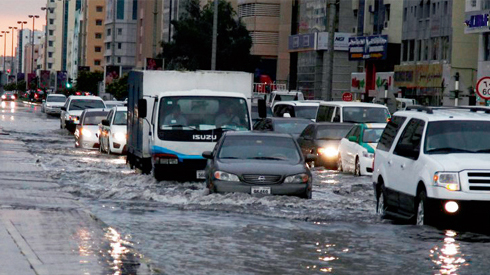
Dubai, Dec 24: It’s not quite a white Christmas. Showers of rain, not snow, have lashed areas of the country causing flooding of some houses and roads.
Rain was recorded at a high of 28.2 millimetres at Sharjah Airport — almost 10 times the rain recorded at the other weather stations across the country. Dubai Airport registered 3mm, Jess Mountain had 5.8mm, while Fujairah, Umm Al Quwain, Abu Dhabi and Ras Al Khaimah stations all measured negligble amounts. Despite RAK’s low recording of 0.2 mm, reports of the worst damage came from the emirate.
According to civil defence sources, heavy rains turned most of the internal roads and open sand spaces into pools of water.
“Traffic snarls are everywhere. Some houses, particularly at lower areas, have reportedly been flooded with non-stop rains,” the source said. Dozens of employees could not reach work in the morning as a result of roads being cut off by the rains. “The situation is expected to be worse with employees returning home in the evening.”
The traffic and patrols department of the RAK Police blocked all the roads and streets leading to the valleys most hit by the showers.
The emirate is still recovering from torrential rains, which fell about a month ago, that flooded and cracked many houses in the north, cut water and electricity supplies, and destroyed the furniture.
No major damage in Dubai
Rain caused no serious problems in Dubai, according to the municipality.
Dubai Municipality Sewage and Irrigation Network Department director Hassan Makki said the showers, that started in the emirate on Sunday night, did not cause any major damage.
“All our teams, the technical and administrative people are managing the situation,” said Makki, who also heads the Rain Committee.
Officials urged the public to call the Municipality Contact Centre’s hotline number (800900) to report any serious emergencies.
A National Centre of Meteorology & Seismology spokesman said seas had been very rough, with waves reaching upwards of 12 feet in both the Arabian Gulf and the Oman Sea.
“The sea will continue to be rough for the next three days till at least Thursday.”
There had also been winds over the country, with temperatures reaching highs of 24 degrees and lows of 14 degrees. Poor weather conditions including rain did not appear to be abating and may hang around for the next few days, particularly in Abu Dhabi and the west of the country, he said.
However, the weather is what was expected at this time of year, he said.
“It’s pretty much almost the same, just a slight degree from the average in terms of the temperature.”





Comments
Add new comment